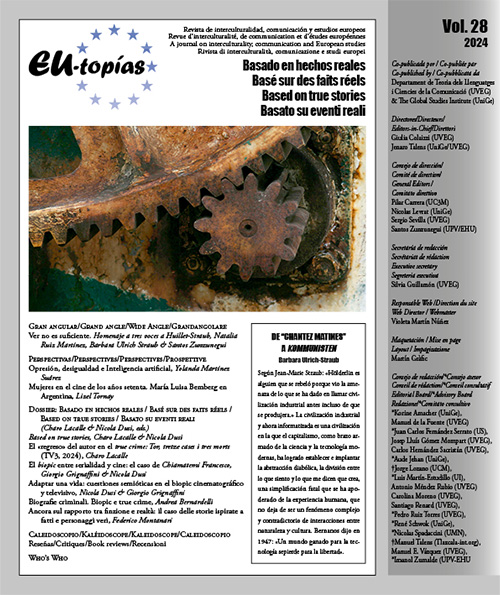Women in the cinema of the seventies. María Luisa Bemberg in Argentina
DOI:
https://doi.org/10.7203/eutopias.28.29667Keywords:
Feminist cinema, women filmmakers, representations of women in cinema, women filmmakers in the seventies of the 20th century, María Luisa Bemberg Abstract
Abstract
This paper aims to highlight the strategies of the first Argentinean feminists in the seventies of the twentieth century in order to question the female representations in cinema that sought to satisfy the male gaze.
The aim is to focus on the particular mode of participation of feminism in Argentina by analysing María Luisa Bemberg's first two film productions, El Mundo de la Mujer (1972) and Juguetes (1978). These productions are part of a rich horizon of exchanges with feminists from the United States and Europe, typical of the politisation of the cultural world in those years.
 Downloads
Downloads
 References
References
Althusser, Louis. Ideología y aparatos ideológicos del Estado. Freud y Lacan. Buenos Aires, Nueva Visión, 1988
Bal, Mieke. “El esencialismo visual y el objeto de los estudios visuales”, Estudios Visuales, Ensayo, Teoría y crítica de la cultura visual y el arte contemporáneo n. 2, diciembre de 2004, pp. 11-50.
Tiempos Trastornados. Análisis, historias y políticas de la mirada. Madrid, Ediciones Akal, 2016.
Barthes, Roland. Mitologías. Mexico D.F., Siglo XXI Editores, 1999.
Colmeiro, José. “¿Una nación de fantasmas?: apariciones, memoria histórica y olvido en la España posfranquista” en Revista electrónica de teoría de la literatura y literatura comparada 4, 2011, pp. 17-34
Crary, Jonathan. Las técnicas del observador. Visión y modernidad en el siglo XIX. Murcia, CENDEAC, 2008.
De Beauvoir, Simone. El Segundo Sexo, París, Gallimard, 1949.
De Lauretis, Teresa. Alicia ya no. Feminismo, Semiótica, Cine. Valencia, Ediciones Cátedra. 1994. 1ra. ed. 1983.
— “La tecnología del género” (trad, Ana María Bach y Margarita Roulet), Mora, Nro. 2, noviembre de 1996, pp.6-34. 1ra, ed. 1987.
Didi-Huberman, Georges. Imágenes pese a todo. Barcelona, Paidós, 2004.
Dorlin, Elsa. Sexo, género y sexualidades. Introducción a la teoría feminista. Buenos Aires, Nueva Visión, 2009.
Dubois, Philippe. El Acto Fotográfico y otros ensayos. Buenos Aires, La Marca editora, 2008.
Foucault, Michelle. Vigilar y castigar. México, Ediciones Siglo Veintiuno, 1976.
Frevert, Ute. Emotions in history. Lost and Found. The Natalie Zemon Davis Annual Lecture Series. Budapest – Nueva York, Central European University Press, 2011.
Giunta, Andrea. Feminismo y Arte Latinoamericano. Historias de artistas que emanciparon el cuerpo. Buenos Aires, Siglo XXI Editores, 2019.
Irigaray, Luce. Ese sexo que no es uno. Madrid, Saltes, 1982.
Johnston, Claire. “Women Cinema and counter-cinema” en Johnston Claire (ed.) Notes on Women’s Cinema. Londres, SEFT, 1973, pp. 24-31.
Mirzoeff, Nicholas. Una introducción a la cultura visual. Barcelona, Paidos, 2003.
Mulvey, Laura. “Visual Pleasure and Narrative Cinema” en Patricia Erens (ed.), Issues in Feminist Film Criticism, Bloomington e Indianapolis, Indiana University Press. Versión en español: Placer visual y cine narrativo, trad. de Santos Zunzunegui, Valencia, Episteme, 1988, 1ra. ed, 1975.
Pollock, Griselda. Visión y diferencia. Feminismos, feminidad e historias del arte. Buenos Aires, Fiordo, 1988.
— “Missing Women: Rethinking Early Thoughts on Images Women” en Carol Squires (comp.) Essays on Contemporary Photography. New York, New Press, 2000, pp. 3-12.
Parker, Rozsika y Pollock, Griselda. Old Mistresses: Women, Art and Ideology, Londres, Routledge & Kegan Paul, 1981.
Rosa, María Laura. Legados de libertad. El arte feminista en la efervescencia democrática. Buenos Aires, Editorial Biblos, 2014.
Sartre, Jean Paul. Lo imaginario. Psicología fenomenológica de la imaginación. Buenos Aires, Losada, 1964.
Saz, Ismael. “Introducción: ¿Qué hacemos con el franquismo?” en Fascismo y franquismo, Valencia, Universitat de Valencia, 2004, pp.13-24.
Tornay, Lizel. “Nuevas fronteras, viejas y nuevas sensibilidades. Mujeres y tensiones de género en Argentina, siglo XX” en Gerardo Yoel (comp.) Silencios y violencias de género. Los Polvorines, provincia de Buenos Aires, Universidad Nacional de Gral. Sarmiento, 2020, pp. 113-132.
Valcarcel, Amelia. Rebeldes. Hacia la paridad. Barcelona, Ed. Plaza & Janés, 2000.
Vasallo, Alejandra. “Las mujeres dicen basta, movilización, política y orígenes del feminismo de los ’70”, en Andrea Andújar et al., Historia, género y política en los ’70. Buenos Aires, Feminaria. 2005, pp. 61-88.
Wollen, Peter. Signs and meaning in the Cinema, Bloomington (USA), Indiana University Press, 1972. 1a. Edición 1969.
Zecchi, Bárbara. Desenfocadas. Cineastas españolas y discursos de género. Madrid: Cátedra, 2014.
Publicaciones periódicas citadas
Diario Clarín, 10-03-1978, p. 38.
Diario La Opinión de la Mujer, 28.03.1978, p. I y II
Diario La Opinión, 23-04-1972, p.15
Diario La Opinión, 26-08-1973, p.6
Diario La Opinión, 12-12-1972, p. 18
Diario La Opinión, 23-04-1972, p.15
Diario La Opinión de la Mujer, “La función de los juguetes”, 28-08-1979, p. III
Diario La Razón, 01-04-1978, p. 6.
Diario Página 12- Suplemento Las 12, “Cuando las mujeres dijeron UFA!!”, 08-01-2010.
Revista La Semana, c. 1978, p. 56.
Downloads
Published
How to Cite
-
Abstract45
-
PDF (Español)22
Issue
Section
License
![]()
The authors conserve the copyright. All content published in EU-topías. Journal of interculturality, Communication, and European Studies are subject to the license Creative Commons Attribution-NonCommercial-ShareAlike 4.0 license. The full text of the license can be found at <http://creativecommons.org/licenses/by-nc-sa/4.0>
They may be copied, used, disseminated, transmitted and publicly displayed, provided that:
- The authorship and original source of the publication is cited (journal, publisher and URL of the work).
- They are not used for commercial purposes.
- The existence and specifications of this license of use are mentioned.
It is the responsibility of the authors to obtain the necessary permissions for images that are subject to copyright.



